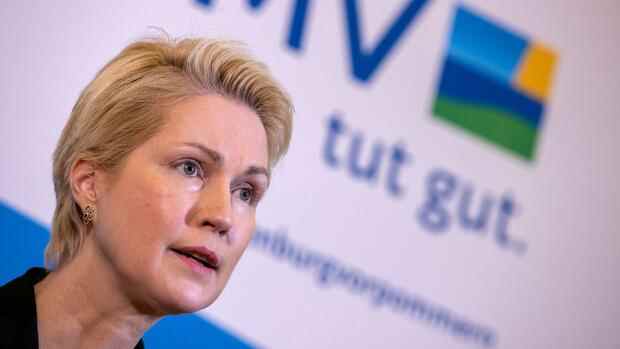Berlin The Prime Minister of Mecklenburg-Western Pomerania, Manuela Schwesig (SPD), was always a vehement supporter of the Nord Stream 2 Baltic Sea pipeline and had also pursued a policy that was extremely pro-Moscow until the Russian war against Ukraine. Now the SPD politician is making a 180-degree turn.
Schwesig announced that he intends to dissolve the MV Climate and Environmental Protection Foundation, which was set up to build the gas pipeline and is primarily financed by the Russian state-owned company Gazprom. “I have asked the board of the foundation to let the work of the foundation rest and to initiate a dissolution of the foundation within the narrow legal possibilities,” wrote the SPD politician on Twitter.
It should also be checked whether the funds from the state foundation could be used for humanitarian purposes.
At the same time, Schwesig defended herself against critics who describe her government as “Putin friends” or “Putin understanders”. “That’s nonsense,” emphasized the SPD politician.
She never spoke to Russian President Vladimir Putin or supported his actions against Ukraine. Putin must stop the war immediately and withdraw from Ukraine, she wrote.
Critics are not very impressed by the prime minister’s change of course. The federal chairwoman of the SME and Economic Union, Gitta Connemann (CDU), told the Handelsblatt that Schwesig had “blindly remained loyal” to Putin until a few days ago. “One could speak of vassal loyalty. Manuela Schwesig’s 180-degree turnaround smells like ‘save yourself if you can’, or at least opportunism.”
The measures that have now been announced are long overdue, Connemann said. With the stop of the foundation, the prime minister is pulling the emergency brake. “Manuela Schwesig would also do well to rededicate the Gazprom millions from the foundation for humanitarian purposes in Ukraine.”
From the point of view of the CSU politician Stefan Müller, Schwesig’s departure from the Kremlin comes “significantly too late”. “It won’t be enough that she wants to wind up her windy Russia foundation,” he told Handelsblatt. “Courts will have to examine whether Schwesig violated money laundering laws with her state foundation.”
CDU MEP Dennis Radtke also voiced sharp criticism. “Schwesig was and is part of the SPD-Russia connection,” he told the Handelsblatt. The dissolution of the controversial foundation is now happening under extreme pressure. Schwesig is apparently “desperately” fighting for her career.
The criticism also stems from the fact that Schwesig has clear economic interests in good relations with Russia. The Nord Stream and Nord Stream 2 pipelines coming from the Federation end on the Baltic Sea coast of their federal state and create jobs.
Schwesig stood by Nord Stream 2 for a long time
Last year, Schwesig campaigned for the completion of Nord Stream 2 despite the escalation of the Ukraine crisis. “I hope for a speedy, rule-of-law procedure so that the line can go into operation,” she said in 2021 in a video message for the New Year’s reception of the Eastern Committee of German Business.
She was pleased that the pipeline was now complete, she said at the time. “I am firmly convinced that we urgently need this Baltic Sea pipeline.”
This is no longer the case. Given the Russian aggression against Ukraine, it is unlikely from today’s perspective that Nord Stream 2 will become operational. After the Russian recognition of the self-proclaimed People’s Republics of Donetsk and Luhansk in eastern Ukraine, the federal government suspended the approval process for the natural gas pipeline.
The decision has also made the future of the Climate and Environmental Foundation MV uncertain. The foundation’s main goal was to support the completion of the pipeline in the face of threats of US sanctions. For this purpose, Nord Stream AG paid 20 million euros to the foundation.
The CDU politician Connemann spoke of a “windy environmental foundation with dubious entanglements”. Under the umbrella of the foundation, Schwesig’s political mentor, the former Prime Minister of Mecklenburg-Western Pomerania and SPD politician Erwin Sellering, “built up an economic business with millions from Gazprom with a single goal of securing the construction of Nord Stream 2,” said the member of the Bundestag . Sellering is the chairman of the board of the foundation.
This is how the Handelsblatt reports on the developments in the Ukraine war:
The foundation should also be an issue this Tuesday when the state parliament in Mecklenburg-Western Pomerania meets for a special session on the war in Ukraine. Schwesig, who is unable to attend the state parliament session after an operation, announced further course corrections for her state’s relations with Russia.
For example, there will be no more “Russia Days” in Mecklenburg-Western Pomerania in the foreseeable future. Business representatives and politicians from Germany and Russia come together every two years at the lobbyists’ meeting, at which Nord Stream 2 AG acted as a “platinum sponsor” last year.
The event is intended to strengthen bilateral economic relations and has been highly controversial since it was founded in 2014. At that time, Russia had just annexed Crimea.
According to Schwesig’s will, the German-Russian partnership association, which is funded with state funds, should also stop its work. A member of the board of the association, Steffen Ebert, works for the gas transport company Gas for Europe GmbH based in Schwerin. The company is to become the owner and operator of the German part of Nord Stream 2.
Against this background, the question of “personal consequences” for Schwesig also arises for the CDU politician Connemann. “Since she took office, the unconditional commitment to Putin’s Russia and political-economic ties to Moscow have been two of the foundations of her work,” she said. This base no longer exists.
Her party colleague Radtke said: “Schwesig’s credibility has been damaged so badly that resignation would be the best thing for her country to do to avert further damage.”
More: Panic on bonds, ruble in free fall: Russian central bank doubles key interest rate to 20 percent
